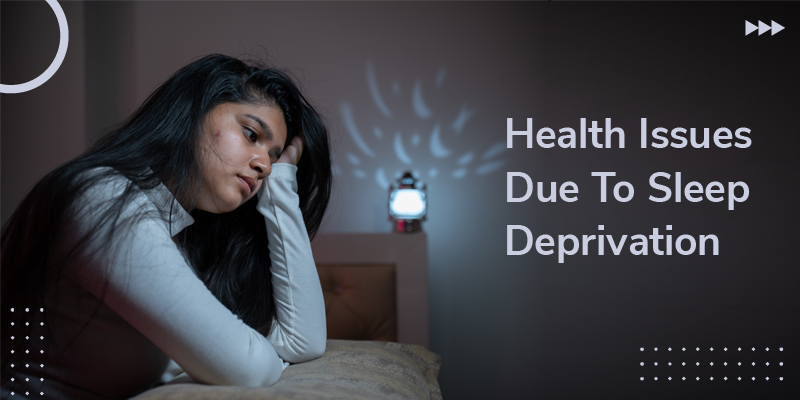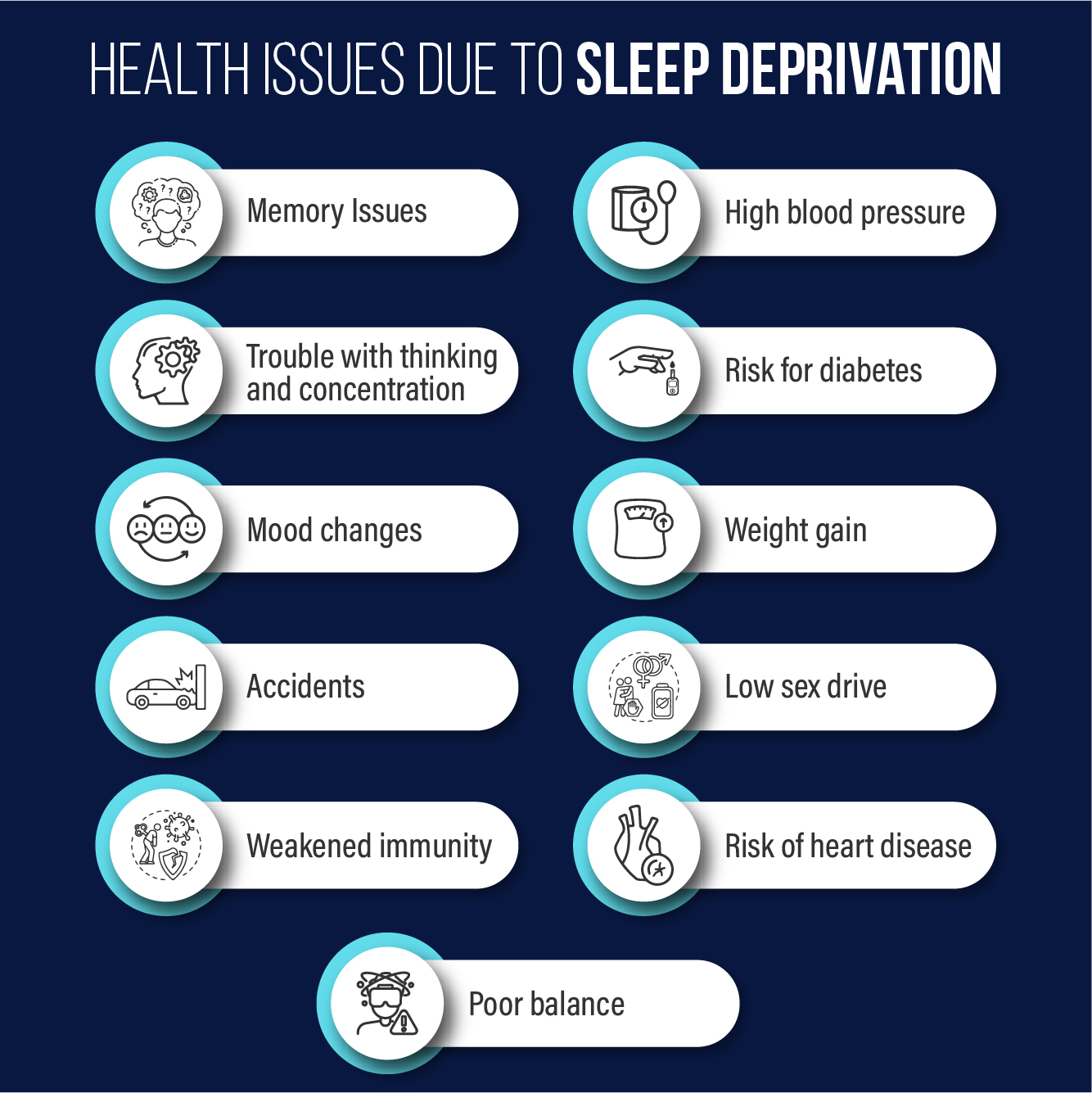
Risks & Causes of Lack of Sleep and Tips for Better Sleep
If you frequently spend your nights tossing and turning, then you sure are aware of how it feels when you’re sleep deprived. Lack of sleep does much more than making you feel groggy and grumpy during daytime; its long-term effects are real as it not only drains your mental abilities but also puts your physical health at risk.
Sleep Deprivation Can Cause Many Health Issues
Sleep deprivation can affect various aspects of health, including:
- Increased risk of cardiovascular disease
- High blood pressure
- Higher risk of Type 2 Diabetes
- Decreased production of growth hormones and testosterone
According to some estimates, 90% of people with insomnia -- a sleep disorder characterized by trouble falling and staying asleep -- also have another health condition. Insomnia has the strongest link to depression. In a 2007 study of 10,000 people, those with insomnia were five times as likely to develop depression as those without. In fact, insomnia is often one of the first symptoms of depression.

Causes of Lack of Sleep:
Our lifestyle and habits contribute heavily to our quality of sleep. The following reasons could result in lack of sleep:
- Having a job that requires working in shifts
- Being under pressure of meeting deadlines
- Noisy sleeping environment due to outside traffic, television, etc.
- Using electronic devices close to bedtime or keeping them in the bedroom
Other factors that could affect the quality of sleep include:
- Health problems like depression, sleep apnea, or having chronic pain
- Caring for another person during night
- Being overweight and overeating at night
- Having mental stress, anxiety or depression
- Substance misuse
Changing Habits to Get Better Sleep
There are many lifestyle areas that could be responsible for the sleep issues and identifying and treating them may help you solve the problem. Whether it is simple tweaks to your daily routine or it involves specialized cognitive behavioral therapy, it is important to understand the problem and work on the solution.
1. Increase exposure to sunlight during the day
Our body has an inbuilt natural clock that keeps track of time, known as your circadian rhythm. This directly affects the brain, hormones and all organs of the body. It helps us stay awake and alert during the day and tells the body to relax when it’s time to sleep. Exposure to natural sunlight during the day helps keep our circadian rhythm healthy and improves our daytime energy levels while regulating our night sleep quality and duration.
2. Be mindful of what you eat and drink
Extremes are bad for a good night sleep so we should neither go to bed hungry nor stuffed beyond our limit. It is better to avoid having oily or large meals within a couple of hours of bedtime. The acidity and discomfort might interfere with sleep. Not just food but we should also stay away from nicotine, caffeine and alcohol. The stimulating effects of nicotine and caffeine take a long time to wear off and disturb quality sleep. Although alcohol might make us feel sleepy, it can also disrupt sleep later in the night.
Also Read: Why Is It Critical For Healthcare Software To Be HIPAA Compliant?
3. Create a peaceful resting environment
It is important to create a room that has a soothing effect that is ideal for sleeping. This usually means dark, cool and quiet. It might not be a good practice to have television or other screens in the bedroom. You could also plan on using room-darkening shades and earplugs to create a peaceful environment. Bedroom temperature can also profoundly affect sleep quality, therefore, set a comfortable room temperature before going to sleep.
4. Include physical activities in your daily routine
Indulging in regular physical activities like cycling, walking, swimming is very good for our bodies and help a great deal in promoting better sleep. However, these should be done during daytime and rigorous exercise should be avoided close to bedtime. It is even better if some part of our daily activity takes place outdoors in fresh air.
5. Minimize worries and stress
Worries and stress are very bad for a good night's sleep. So, we should try to resolve our worries before bedtime. It might be helpful if we get more organized, plan our next day’s schedule, set our priorities and delegate tasks instead of handling everything on our own. Relaxation techniques before bed have been shown to improve sleep quality. Developing a routine of doing calming activities before bedtime, like taking a bath or meditating help in promoting better sleep.
Sleep plays a key role in our health. Correcting our sleep pattern plays a critical role in guaranteeing good health and well-being. So, let’s make sleep a top priority in our wellness plan.
If you frequently spend your nights tossing and turning, then you sure are aware of how it feels when you’re sleep deprived. Lack of sleep does much more than making you feel groggy and grumpy during daytime; its long-term effects are real as it not only drains your mental abilities but also puts your physical health at risk.
Sleep Deprivation Can Cause Many Health Issues
Sleep deprivation can affect various aspects of health, including:
- Increased risk of cardiovascular disease
- High blood pressure
- Higher risk of Type 2 Diabetes
- Decreased production of growth hormones and testosterone
According to some estimates, 90% of people with insomnia -- a sleep disorder characterized by trouble falling and staying asleep -- also have another health condition. Insomnia has the strongest link to depression. In a 2007 study of 10,000 people, those with insomnia were five times as likely to develop depression as those without. In fact, insomnia is often one of the first symptoms of depression.

Causes of Lack of Sleep:
Our lifestyle and habits contribute heavily to our quality of sleep. The following reasons could result in lack of sleep:
- Having a job that requires working in shifts
- Being under pressure of meeting deadlines
- Noisy sleeping environment due to outside traffic, television, etc.
- Using electronic devices close to bedtime or keeping them in the bedroom
Other factors that could affect the quality of sleep include:
- Health problems like depression, sleep apnea, or having chronic pain
- Caring for another person during night
- Being overweight and overeating at night
- Having mental stress, anxiety or depression
- Substance misuse
Changing Habits to Get Better Sleep
There are many lifestyle areas that could be responsible for the sleep issues and identifying and treating them may help you solve the problem. Whether it is simple tweaks to your daily routine or it involves specialized cognitive behavioral therapy, it is important to understand the problem and work on the solution.
1. Increase exposure to sunlight during the day
Our body has an inbuilt natural clock that keeps track of time, known as your circadian rhythm. This directly affects the brain, hormones and all organs of the body. It helps us stay awake and alert during the day and tells the body to relax when it’s time to sleep. Exposure to natural sunlight during the day helps keep our circadian rhythm healthy and improves our daytime energy levels while regulating our night sleep quality and duration.
2. Be mindful of what you eat and drink
Extremes are bad for a good night sleep so we should neither go to bed hungry nor stuffed beyond our limit. It is better to avoid having oily or large meals within a couple of hours of bedtime. The acidity and discomfort might interfere with sleep. Not just food but we should also stay away from nicotine, caffeine and alcohol. The stimulating effects of nicotine and caffeine take a long time to wear off and disturb quality sleep. Although alcohol might make us feel sleepy, it can also disrupt sleep later in the night.
Also Read: Why Is It Critical For Healthcare Software To Be HIPAA Compliant?
3. Create a peaceful resting environment
It is important to create a room that has a soothing effect that is ideal for sleeping. This usually means dark, cool and quiet. It might not be a good practice to have television or other screens in the bedroom. You could also plan on using room-darkening shades and earplugs to create a peaceful environment. Bedroom temperature can also profoundly affect sleep quality, therefore, set a comfortable room temperature before going to sleep.
4. Include physical activities in your daily routine
Indulging in regular physical activities like cycling, walking, swimming is very good for our bodies and help a great deal in promoting better sleep. However, these should be done during daytime and rigorous exercise should be avoided close to bedtime. It is even better if some part of our daily activity takes place outdoors in fresh air.
5. Minimize worries and stress
Worries and stress are very bad for a good night's sleep. So, we should try to resolve our worries before bedtime. It might be helpful if we get more organized, plan our next day’s schedule, set our priorities and delegate tasks instead of handling everything on our own. Relaxation techniques before bed have been shown to improve sleep quality. Developing a routine of doing calming activities before bedtime, like taking a bath or meditating help in promoting better sleep.
Sleep plays a key role in our health. Correcting our sleep pattern plays a critical role in guaranteeing good health and well-being. So, let’s make sleep a top priority in our wellness plan.



